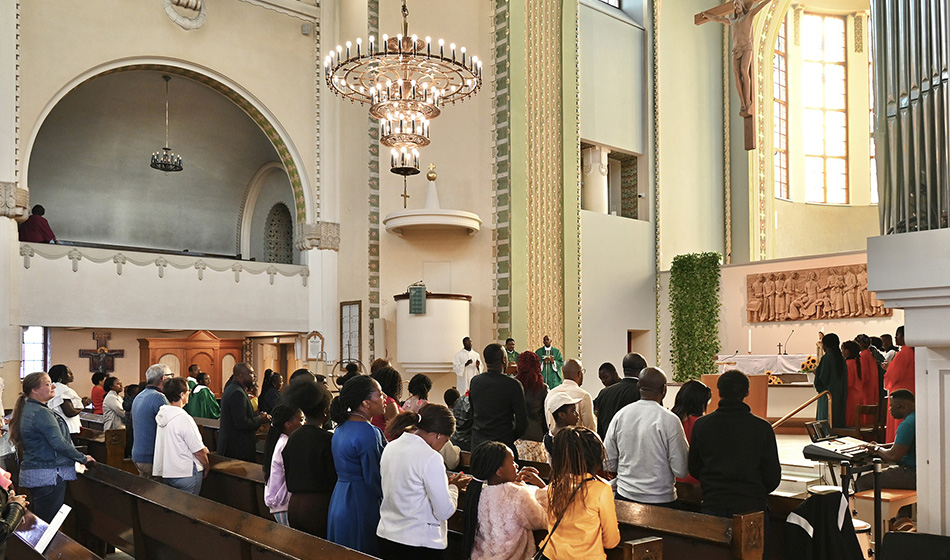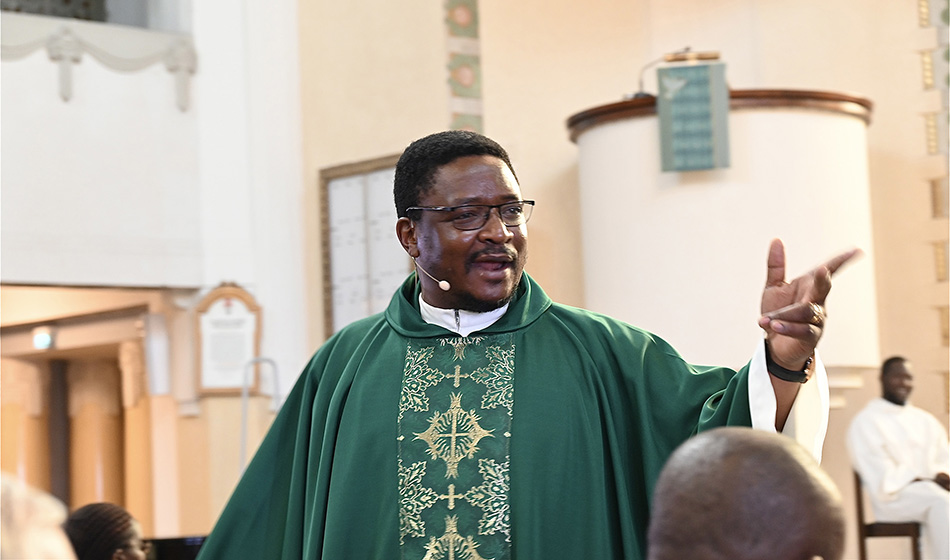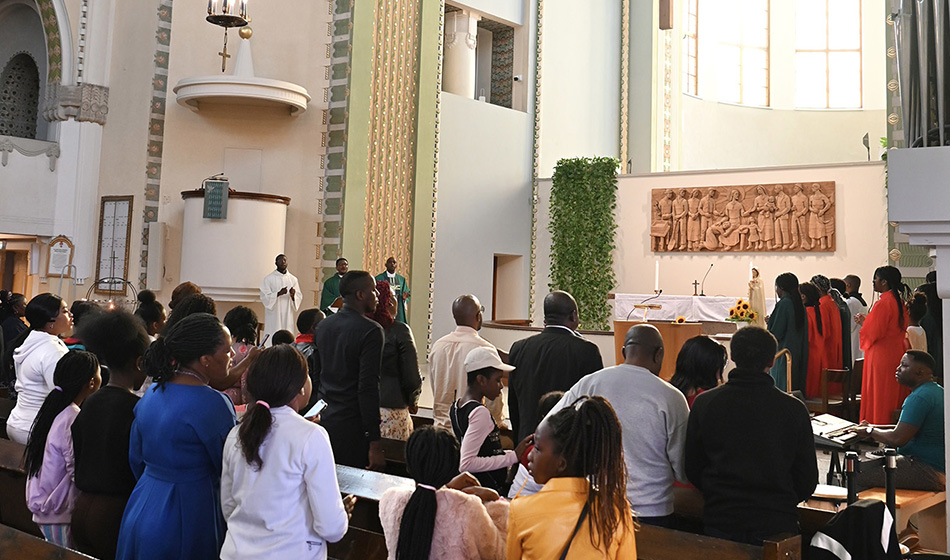In summer the African Catholic Chaplaincy in Finland celebrated its 5th anniversary. This autumn the community’s weekly Sunday Mass has changed location to the Evangelical Lutheran church of Kallio. The chaplain Fr. Leonard Wobilla answered some questions.
In June this year, the African Catholic Chaplaincy in Finland had its 5th anniversary. Saint Mary’s church was full, which we consider an achievement – having the same Chaplaincy operating for five years – What do you think this tells us?
Indeed! I concur with your assertion that the massive attendance on the 5th anniversary of the African Catholic Chaplaincy in Finland was a sign of great achievement. Besides, there is no event celebrated with a High Mass by a bishop that should be considered unimportant. His Excellency, Bishop Emeritus Teemu Sippo, who authorised the creation of ACCF, graced that day with his presence and wonderful sermon, which emphasised the reason ACCF should exist and continue to grow by leaps and bounds.
I think that we have all been working really hard to get this far. There is no turning back and I would like to seize this opportunity to encourage us all and urge us to work and pray even harder given the challenges that lie ahead. Remember, the challenges are bigger when we grow as a community.
I pray most especially that our love for one another, prayers, and commitment to the cause should keep us together and alive now and forever. Let’s continue to pray for Bishop Emeritus Teemu who has been a great inspiration for this endeavour from conception to present.
Was it difficult to convince the Bishop or other priests about the need for the Chaplaincy?
Not at all. The initiative and decision were basically all his and were supported by his close collaboration at that time. I was also of great support in helping him realise his dream of helping African immigrants. As shepherd of the flock in Finland, he was and still is, though retired, a very devoted and committed minister in God’s vineyard. Given the shift in the international migration situation since the year 2000, I think the Bishop witnessed the flow and increase of African migrants and Catholic faithful into this country, Finland.
His decision being informed by the Catholic social teaching, I get the impression that it was a welcome relief for all. We can see the results for ourselves. Our community members who are beneficiaries could best testify to this. Although this initiative was welcomed by many, not all were happy about it. Some priests, however, did not and still do not see it as an important step for the growth of our Diocese.



Who else do you think was instrumental in this project? To whom are you most grateful?
Principally, the episcopate and college of consultors led by the Holy Spirit. You must understand that every decision and creation of the Church is informed by very sound judgement. Of course, this would not have been possible without the congregants themselves. If they did not exist, ACCF would never have been created.
Nevertheless, the authority, wisdom, and vision of Bishop Emeritus Teemu must be commended. And also Fr. Raimo Goyarrola and the other Opus Dei Priests in Helsinki and the Dominican Friars have been very supportive of the ACCF. May God bless and reward them.
There is certainly some activity also apart from the weekly Masses.
There are a lot of expectations, and we are aware of that. We do a lot of things and will continue working hard in every aspect to meet our expectations. Our work is within the framework of Catholic social teaching and the Gospel. We keep this in mind and continue to work within its principles and norms. Given the current challenges, I must confess that we are yet to fully meet our expectations. However, we continue to move. Who knew we would get to where we are today? We have small Christian communities in Espoo, Helsinki, and Vantaa. We arrange Masses with them in their meeting places as often as possible. As stated already, we give priority to family apostolates by visiting families, counselling, listening to their challenges, and encouraging them.
The Masses of the Chaplaincy have now moved to another location, Kallion kirkko, which is an Evangelical-Lutheran church in the heart of the city. Why was it necessary to move?
From crawling, a child will eventually walk. It could be seen from the 5th anniversary celebration that the community has grown exponentially. St. Mary’s church, which hosted the Mass, proved too small for the congregation. This partly justifies why we must move to a bigger church. The church in Kallio has a capacity of about 1,000 people and a huge parking area for almost everyone at a Sunday Mass. We are hoping to have this location for as long as possible. We will be very happy if we can secure a permanent location for the Chaplaincy in the near Future. We need to be stable, wouldn’t you agree?
What are your and the Chaplaincy members’ feelings about the fact that the Masses are celebrated in a church that is not Catholic?
The Lutheran church isn’t quite different from the Catholic Church. You probably should know about the history of the birth of Lutheranism. I would say the Lutheran Church is an offshoot of the Catholic Church. I think there are a lot of things that should unite rather than divide us. I would therefore advocate that we seek to mend bridges and cooperate with one another in both the good and bad moments. That is the essence of ecumenism, the promotion of unity amongst the world’s Christians in our diversified gifts and nature. Remember, according to the Bible Christian unity is both a gift and a calling. I think we are all good with this new beginning. Of course, if there are any concerns, we will address them as we move on. There is always room for dialogue, understanding, and reconciliation.
How would you describe the ecumenical relations in Finland?
We are doing just fine in that regard. That we can be offered a church building by the Lutheran authority is testimony of that fact. There exists the Finnish Ecumenical Council (FEC) established since 1917, when the Finnish Committee of the World Alliance Movement was founded for Promoting International Fellowship through the Churches aimed at fostering peace work through inter-church friendship. Right now, the Council counts 11 member churches including ours, the Catholic Church in Finland. We are doing well and moving on.
Living in Finland as a foreigner is not always easy. What would you say is the most difficult thing about living in this country? In your experience, what seem to be the biggest difficulties or problems that Africans face in Finland?
In my humble opinion and from personal experiences, the greatest difficulties of living in Finland are the language and the climate. To an extent, a lot of cultural differences also make life sometimes difficult for foreigners.
I think that the biggest problems that Africans and other immigrants face in this country could be bundled up under integration. I think effective integration is a very big difficulty for every immigrant in this country. Integration should mean a lot to all immigrants and requires that we learn and understand the culture of the Finnish people, which is new to us, yet very vital for our success. Yes, we need to learn the language and understand the culture and nature of the Finnish people to be able to fully participate and feel settled and accepted in the country. This seems a huge but very necessary challenge.
And while this is a big challenge for us, I think we also must understand that Finns too have challenges integrating with us because we too come with our own inherent cultural baggage that adds to the difficulties. Notwithstanding, I think such is life in the twenty-first century.
On the other hand, is there something positive that you could mention?
There are lots of positives about Finland. In fact, it seems to me that everything is positive besides the natural difficulties cited above. Being accepted as an immigrant in this country is first and foremost the biggest positive. Even if we get work inferior to our academic qualifications, I still will consider that a positive in relative terms. I think everyone in this country has the opportunity or possibility to survive, even without a job. It is therefore fair for me to conclude that this country is a safe and good place in which to live.
Immigration from Africa is a phenomenon that is steadily continuing. Do you know which are the biggest national groups that come to the Chaplaincy?
Yes, that is a fact. There is an increasing trend of migration from Africa to Finland. The Finnish government and universities are reaching agreements with some African countries to have their citizens move to Finland for diverse reasons, including for education. That aside, Finland is open for all and seemingly becoming one of the finest destinations for international students from Africa. That is, for those who can afford university tuition. As for the biggest African national immigrant groups constituting the Chaplaincy, they include: Kenyans, Cameroonians, Nigerians, Ghanaians, Zambians, Tanzanians, Ugandans, and many others.
Is there any rivalry between the many nationalities, or is the Chaplaincy rather able to unite them all? Is there really a recognisable, unified African mentality?
I am not sure about rivalry. I can, however, affirm to you that there is some form of acceptable competition among the different immigrant groups in relation to our Chaplaincy activities. Healthy competition is a good thing, you know. We have different immigrant groups assigned for singing on different Sundays. This encourages competition, which produces effectiveness and efficiency in participation. We have not yet experienced any inconveniences with this practice.
As for a recognisable, unified African mentality, I think we are getting there. Remember that it is only five years down the line that ACCF was created. You can attest to the fact that the community is growing and we are able to meet occasionally and do things together. It is a good thing, right steps in the right direction. We will get there together. Of course some differences and misunderstandings come up but we manage them as soon as possible to avoid bad seeds in the field.
The Africans form a reasonably big portion of the Catholic Church in Finland. At this moment, there are about 16,500 registered Catholics in this country, consisting 45% of locals, 55% of immigrants. Calculations show that the number of immigrants could be much more if all would register themselves as members of the local Catholic parishes. How often do you encounter Catholics who still haven’t registered?
There is still a handful who are yet to register. We are making efforts to remind them as often as we can. As demanded by the ethics of the profession, we are patient, noble, civil, and kind enough in our approach. First and foremost for us is to nourish them spiritually for a stable and settled mind. We understand that as immigrants, there is a lot to grapple with. We live in time and time does not escape us. Time is of the essence. We will gradually get them registered. I encounter many who are not registered, particularly when they come for sacraments like Baptism for their children, etc.
As the African community is becoming more visible, there are probably many opportunities as well as challenges. What are, then, the aims and dreams of the ACCF for the future? In the short term?
I see a lot of challenges. The numbers are growing and bringing along challenges. I think we need to fully constitute ourselves as an entity deserving of the capacity to face the challenges ahead. We need adequate capacity in terms of logistics. We need to be able to execute our assignments with effectiveness and efficiency within the framework of acceptable standards. We have to work really hard to attain our goal, the goal set for us by Bishop Emeritus Teemu when he created the ACCF. We need an office space to be able to receive different immigrants on working days.
And in the longer term?
Our presence is basically limited to Helsinki, whereas we have members of our community settled in different parishes in the Diocese. We need them and they need us. Our long-term goal is to scale up our activities and be able to operate branches in the different parishes across Finland. We need to see that these immigrants feel effectively integrated and feel properly nourished in the Spirit.
It is said that some African Catholics are worshipping in small, charismatic non-Catholic communities and do not visit the Catholic church anymore. What are their reasons, and can something be done?
Yes! Our church is not big enough in human and infrastructural capacity and so lacks a ready presence in lots of towns across Finland. We need more vocations to the priesthood. We are calling for unceasing prayers for more vocations in our Diocese. Most of these Catholics attending other churches are found in places where the Catholic Church does not have a presence. Many other reasons account for why some choose to worship in other churches. Some reasons could well be very personal. Proximity to a church other than the Catholic church is another factor. Like I have indicated above, immigrants face lots of challenges and the creation of the ACCF is part of the solution to these challenges. We will continue to do our best to catch up with them and support them through all the difficulties. Most went to these churches before the creation of the ACCF and are now coming back.
People from different countries and traditions attend the Chaplaincy’s Masses. Who are they for – just Africans, or are they open to anybody? Can non-Catholics come? Any conditions?
ACCF is open to all. We are all children of God, irrespective of background, etc. Like indicated above, all people, both immigrants and Finns, face challenges. We are open to feeding anyone spiritually with the Gospel message and the love of Christ. All are welcomed into the house of the Lord. Many from Asia and Southern Europe attend our Masses. Finns, too, come to the Chaplaincy’s Masses.
Yes, non-Catholics are welcome and can participate fully at Mass. Yet, it is not possible for them to receive Holy Communion. They can, however, receive a blessing from the priest, if they so desire.
Lastly, something about you: Lately, you have been studying in Rome. What is your goal and what is it all about?
My studies in Rome are in line with the vision and goal of the ACCF. His Excellency, Bishop Emeritus Teemu felt that it was necessary for me to study the situation of immigrants in Finland as part of the solution to the challenges that we all are facing in the country. Fundamentally, this is in line with the Catholic social teachings. The goal is to present a new perspective to immigrant integration in line with the Catholic social teachings, through its seven pillars: Human Dignity, Community and Participation, Care for God’s Creation, Dignity in Work, Peace and Reconciliation, Solidarity and Common Good and, finally, Charity. The Title of my work is Integration of African Immigrants in Finland: The Role of the Catholic Church.
What are the three most important things in your priestly life?
Prayers, harmony, and respect for human dignity.
Whom would you like to greet now especially?
Bishop Emeritus Teemu, the Opus Dei priests in Helsinki, the Dominican friars in Helsinki, Jan-Peter Paul, and the Department of Communiations for always supporting us, all the Chaplaincy members, and the entire Kallio Church community.
Thank you for the answers!
Marko Tervaportti
Interview in Finnish: fides.katolinen.fi
Bishop emeritus Teemu Sippo S.C.I. will celebrate a festive Mass of Thanksgiving for the African Catholic Chaplaincy in the presence of ecumenical guests in Kallio Church on Sunday, Nov. 13, at 12.00 noon. Welcome!